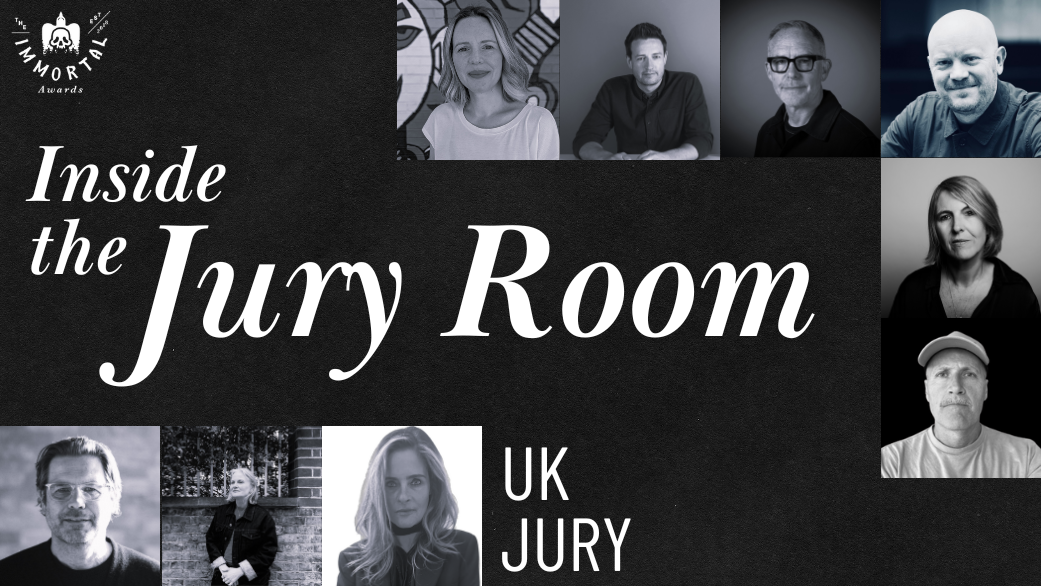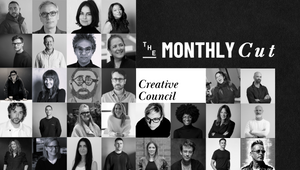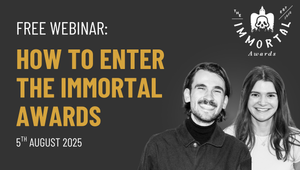
Inside the Jury Room: “Gut-Wrenching Work” Celebrated as the UK Jury Puts Forward Varied Finalists

Some of the UK’s most prominent creative and production leaders convened in London this week for the country's round of Immortal Awards judging.
Taking place on Wednesday, October 18th thanks to support from Framestore and Company 3, the jurors cast judgement on a shortlist of 24 projects, which had scored highest in the online round of judging prior to the in-person session.
Five projects were elevated and will represent the UK in the regional European round of judging, which takes place today on Friday, October 20th. Check them out here.
The UK jury was made up of: Sue Higgs, executive creative director at Dentsu Creative London; Mark Hunter, co-founder and creative director at Accomplice; Richard Hunter, creative director at Specsavers; Juliette Larthe, partner and executive producer at PRETTYBIRD; Matt Lee, executive creative director, M&C Saatchi London; Mike McGee, co-founder and chief creative officer at Framestore; Helen Rhodes, executive creative director at BBH London; Mike Sutherland, executive creative director at adam&eveDDB; and Fran Thompson, managing director at Park Pictures London.
The five Finalists are notable for the variety of media represented among them, suggesting that the UK creative landscape is demonstrating some good range this year. Some work put forward was celebrated for the impact it had on British culture – a key benefit of holding local juries before Finalists progress to more international judging.
“I was surprised by the content of the work and the breadth of mediums,” said juror Fran Thompson, managing director at Park Pictures London. “The fact we were discussing music videos and short films on the same platform as ads was refreshing. It made us question what makes a piece of work that can withstand the test of time. I loved that we debated whether a Stormzy music video could be immortal and that we clashed over the premise that a cleaning product sponsored/paid for a charity ad. We debated this and concluded that it gave a different level to the filmmaking that could not be achieved without that promotion and did not make it a lesser film or reduce the performance or message.
“I was also shocked by some of the entrants, but this also made me question some of the pieces we had entered as a company and also proved what a high bench mark there is in these awards,” she added. “As jurors, and leaders in the industry, we had space to have complex conversations about what it means to make good work in this day and age. How we were often moved by a campaign's intention and message but not the craft or execution of the filmmaking itself. For truly great work, the two things must come together seamlessly to uplift and amplify. I loved that nine adults from different backgrounds could have their opinions swayed by the power of discussion. I altered my opinion on entrants that I had judged with a high score and could see how they didn’t fit in the category of ‘immortal’. I feel proud of the five that we judged and put forward. It was a perfect team effort.”
“I’ve just popped the immortal cherry,” said juror Sue Higgs, executive creative director at Dentsu Creative UK. She found the experience of the jury room positive. “I love the fact that there’s no ridiculous delineated categories, ‘best local social digital’ or ‘best native social local’ or whatevs. And the mistress to guide is the sharp whip of ‘Is it immortal?’
“We saw some powerful emotional gut-wrenching work. As well as some funny work (not enough for my liking),” she added. “As ever the beautifully crafted simply executed stuff rose to the top and will live on to inspire for the next mortals who step up to the creative plate.”
Mark Hunter, founder and creative director at Accomplice, had a “fun and inspiring day judging the Immortal Awards. The whole experience felt refreshingly simple and un-corporate,” he said. “It’s clear that making great work is more important to LBB than making great money. Nice to not suffer an agonising ‘death by category’ as one often does while judging. At the Immortals the categories are simply 'great or not great’. By eliminating bronzes, silvers, merits and distinctions, etc. judges are left with a very simple choice… is this good enough, or not? It’s a binary question. Is it immortal?
“I was struck by the lack of funny in this year’s body of work,” he said, echoing a common theme from the day’s discussion. “Whether by design or by chance there didn’t seem to me much work aimed at the funny bone. Plenty of purpose on offer, though, and that’s not a bad thing. There are some serious conversations happening in the world and it’s important our industry and our clients are not left out of them.”
Mark was surprised there wasn’t more Christmas work in the shortlist. “But it would seem much of it got stuck in the chimney this year,” he said. “Of the five finalists only one submission fell into the category of what you might call traditional advertising. That struck me as a good thing.”
Thanks to our wonderful Immortal Awards partners















